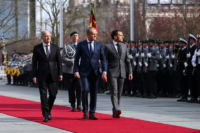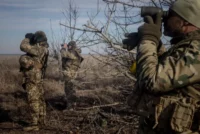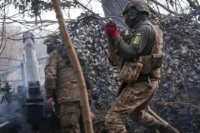
The heroism of Ukraine and the nihilism of Mike Johnson
Late morning Monday, from occupied Crimea, the Russians launched two hypersonic ballistic missiles at Kyiv. Our friends heard the explosion and the air raid sirens simultaneously — which is unusual. Hypersonic missiles are faster than the speed of sound.
Fragments hit the Academy of Decorative and Applied Arts and Design, where the students, with no time to get to the shelter, lay down on the ground.
Kyiv is dependent on air defense. In turn, air defense is dependent on American aid, and that aid is currently hostage to House Speaker Mike Johnson, who is at the moment among Russian President Vladimir Putin’s most powerful allies.… Seguir leyendo »
















